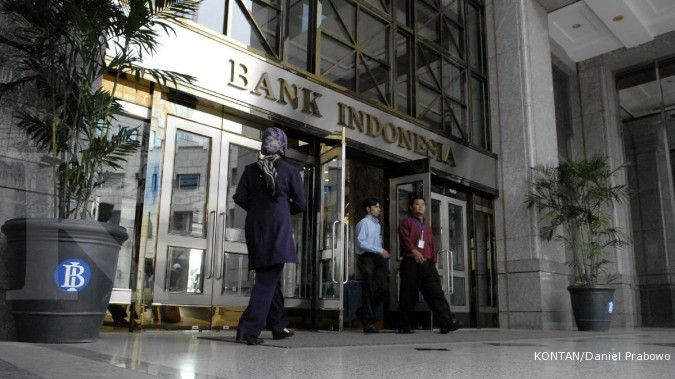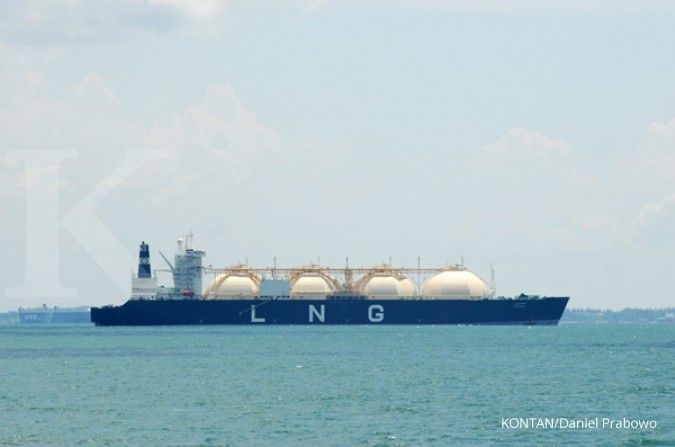JAKARTA. Bank Indonesia (BI) kept its key interest rate unchanged for the second consecutive month on Thursday despite signs of a decline in inflationary pressure following the sharp drop in oil prices.
The central bank’s board of six governors led by Agus Martowardojo kept the benchmark BI rate at 7.75 percent as they deemed the rate was still in line with its inflation and current account deficit targets.
BI also retained the overnight facility (Fasbi) rate at 5.75 percent while maintaining the lending facility (Repo) rate at 8 percent.
In a statement released after the meeting, the central bank said it would focus on macroeconomic stability management, not economic growth. BI also argued that the existing tight-bias monetary stance would still be required to cope with external challenges such as interest rate hikes in the US and uneven global recovery.
“Our monetary policy must remain tight, given the external risks ahead,” BI spokesperson Tirta Segara explained to reporters at his Jakarta office. “But our macroprudential policies would be accommodating in compensation for the tight monetary policy bias.”
BI’s decision to keep its interest rate and retain its tight-bias monetary policy stance amid the decline in the inflationary pressure in the Asian region due to falling global oil prices, which theoretically should give room for looser monetary policy.
On Thursday, Indian central bank cut its key lending rate by 25 basis points to 7.75 percent, the first reduction in 20 months, with Reserve Bank of India (RBI) Governor Raghuram Rajan signaling further rate cuts in the future due to easing inflationary pressures.
In response to falling global oil prices, President Joko “Jokowi” Widodo has announced his plan to cut the price of Premium gasoline to the range of Rp 6,400 (5 US cents)-6,500 per liter, from the existing price of Rp 7,600.
If realized, the fuel-price cut would push down Indonesia’s annual inflation by 0.24 percent this year, according to Juda Agung, BI’s executive director for economic and monetary policy.
The Indonesian central bank anticipated that this year’s inflation will fall 4 to 6 percent. In December, inflation surged to a one-year high of 8.4 percent after Jokowi increased fuel prices one month after taking office.
“We see structurally lower oil prices keeping fuel costs on a declining trend and capping inflation expectations [in Indonesia],” Daniel Wilson, a Singapore-based economist with ANZ Bank, said via an email interview on Thursday.
An increase of interest rates in the US would not adversely effect capital flows to Indonesia given its sound macroeconomic indicators, Wilson argued. There might be “stronger convictions on the call for rate cuts” in Indonesia in the second half of 2015, he said.
Nevertheless, BI officials have warned that cutting the interest rate too soon would spark bearish sentiment on the rupiah. The Indonesian currency depreciated 1.7 percent last year and has fallen 1.4 percent so far this year to trade at 12,617 per dollar on Thursday, according to the Jakarta Interbank Spot Dollar Rate (JISDOR).
Indonesia’s central bank raised the key rate to 7.75 percent from 7.5 percent at an unscheduled meeting on Nov. 18, the first increase in a year. The central bank kept the rate unchanged on Dec. 11.
The rupiah closed 0.5 percent stronger at 12,560 a dollar before the rate decision, according to prices from local banks. One-month non-deliverable forwards pared gains after the announcement, rising 0.5 percent to 12,644 as of 6:33 p.m. in Jakarta after advancing as much as 1.1 percent earlier in the day, data compiled by Bloomberg show. (Satria Sambijantoro)
BI rate kept steady; no sign of rate cut
January 16, 2015, 10.28 AM
/2013/04/10/1644885979.jpg)
ILUSTRASI. BMKG meramalkan cuaca di Yogakarta cerah hinna cerah berawan pada Sabut (29/7) besok
Source: The Jakarta Post
| Editor: Hendra Gunawan
Latest News
-
March 02, 2026, 04.45 PM
Indonesia has Seized 5 Million Hectares of Palm Oil Plantations, Task Force Says
-
March 02, 2026, 01.10 PM
Asian Assets Slide as Mideast Strikes Spark Oil Spike, Haven Rush
-
March 02, 2026, 10.49 AM
Bank Indonesia Monitoring Market Movements in Response to Conflict in Middle East
-
February 25, 2026, 08.28 PM
Inpex to Solicit Bids for Construction of Indonesia's Abadi LNG Project in Mid-2026
-
February 24, 2026, 03.38 PM
Eni to Reach Final Investment Decision for Indonesia Gas Projects Next Month
-
February 24, 2026, 01.00 PM
Asia Stocks Try to Steady after Wall Street Selloff Sims Mood
-
February 23, 2026, 04.50 PM
Wall Street Futures and Dollar Slide on Trump Tariff Tumult
-
February 23, 2026, 02.17 PM
Indonesia's Government Spending Jumps 26% in January 2026
-
February 23, 2026, 01.47 PM
Indonesia's Government Spending Jumps 26% in January












